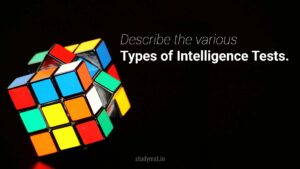In this article, we will Define Personality Assessment. Discuss the Purpose of Personality Assessment.
Purpose of Personality Assessment as follows:
Nunnally has opined that personality measurement aims at studying the four broad types of traits, that is, i) Social Traits, ii) Motives, iii) Personal Conceptions and iv) Adjustment. These are being discussed below:
i) Social Traits
Social Traits are those traits, which determine how persons interact with other persons in society. Example – friendliness, honesty, responsibility, dominance, shyness, etc.
Read Also:
Explain Allport’s Trait Theory.
ii) Motives
Motives here include the non-biological drives such as the need to earn money and prestige, need for academic, achievement, need for affiliation, aggression, etc. These non-biological needs are often said to constitute what is known as personality dynamics.
iii) Personal Conceptions
Under the trait of Personal Conceptions are included those methods which determine people’s attitude toward self and others, a person’s values, interests, etc.
Read Also:
Describe the Psychological Factors that Influence the Development of Personality.
iv) Adjustment
Adjustment in psychology refers to the establishment of a satisfactory relationship representing harmony, adaptation, conformance or the like. It is a process of finding and adopting modes of behaviour suitable to the environment or the change in the environment. Adjustment is the process by which a living organism maintains a balance between its needs and the circumstances that influences the satisfaction of these needs. Adjustment includes traits like the freedom from emotional worries or instability and other related aspects of behaviour.
Read Also:
Discuss the Purpose and Strengths of Interview Method.
One general characteristic of these four types of traits is that they are correlated with each other. For instance, a social trait, say dominance, is likely to influence motives, personal conceptions (attitudes, interests) and adjustment. Similarly, an individual’s motive is likely to influence the interaction of the person with others in society (social traits). It would also include the individual’s conceptions and adjustment.
Read Also:
Explain Thematic Apperception Test. Discuss Its Limitations.
For example, an individual is highly prejudiced against a particular caste (personal conception). In such cases, the individual’s social interaction, motives, and adjustment all would be similarly affected. Likewise, if a person has a satisfactory general adjustment, That person’s social traits, motives and personal conceptions would be similar to social norms. On the other hand, if an individual is maladjusted, she/he would have extreme social traits, unusual motives and personal conceptions.
Follow us:
If you like this article, you can Follow us on Facebook.
Also, you can Join our Official Facebook Group for QnA Sessions and Discussions with the worldwide IGNOU community.

